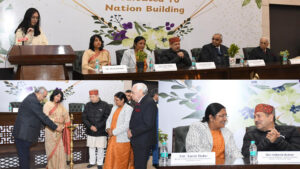
Ajay Shastri
Editor & Publisher of BCR News & Bollywood Cine Reporter (Newspaper)
Noida, UP: Women have been the worst sufferers of COVID-19 due to multiple reasons. The pandemic warrants a reminder that reproductive rights are human rights – they are essential and urgent
It may not be wrong to say that human rights were introduced in India right back in 1950 with the development of the Constitution of our country. The human rights movement has seen rapid progress and success, and many national programs and mechanisms have been introduced to complement the growing recognition of an individual’s rights.
Reproductive rights continue to be ambiguous in the Indian context. While the importance of the rights of both men and women to choose and control their own reproductive functions has gained prominence, the introduction of this concept is especially complicated in India given the complex social structures – procreation is often seen as a social expectation and an individual’s rights are overlooked. However, in recent times, reproductive rights in a more comprehensive sense have gained attention. This can, in some way, be attributed to the relentless efforts of civil society organizations that have reinforced the relevance of international treaties into the Indian context.
Experts have pointed to how reproductive rights form an integral part of human rights at a broad level and even of our Constitution at a national level, and therefore India’s obligations to them. There is reciprocity between reproductive rights and a larger human rights framework. Just as human rights cannot be realized without promoting women’s reproductive rights, reproductive rights draw their meaning and force from long-recognized human rights. However, the merging of the two in practice remains ambiguous. Indeed, the fact that reproductive rights apply to everyone – irrespective of age and marital status – is a concept difficult to get through to an Indian audience. It is no surprise then that reproductive rights have not been completely established despite being an innate part of every individual.
In India, one woman dies every 15 minutes due to lack of healthcare during pregnancy and childbirth. Although the country legalized abortion almost five decades ago, access is extremely limited, and it is estimated that one woman in India dies every three hours due to an unsafe abortion. Despite a national law penalizing marriage of girls below 18 years of age, in practice India continues to account for the highest number of child marriages; and despite policies and schemes guaranteeing women maternal healthcare, India accounts for 20% of all maternal deaths globally. Various states have enacted coercive population policies that exclude families with more than two children from welfare programs, government jobs, political participation, and access to education and health facilities – without guaranteeing couples access to a full range of contraceptive services.
Further, Indian women face among the world’s highest risk of HIV/AIDS and discriminatory treatment if infected, forced abortions of female fetuses, trafficking for forced prostitution, custodial rape in government institutions, sexual harassment in the workplace; and harmful customs that seriously undermine reproductive health. The issue of right to reproductive health especially abortion, takes on special significance in the Indian context as various national and international stakeholders struggle to bring meaning to the important concepts of women empowerment, rights and choice.
For example, a woman should have the space to decide whether she wants to marry or not, who she wants to marry, whether she wants to have children or not, how many children does she want to have, and what will be the spacing between them. This becomes important because even though both the male and the female participate in procreation, it is the female who has the biological responsibility of ensuring the complete development of the fetus. Pregnancy has a larger and more lasting effect on the woman who is pregnant in comparison to her partner. It therefore becomes a woman’s human right to decide whether and when she wants to have children and choose what happens with her body.
Historically, reproductive health-related laws and policies in India have failed to take a women’s rights-based approach. Simply put, based on the multiple definitions of reproductive rights, it can be said that they include some or all of the following rights – right to safe and legal abortion; right to control one’s reproductive functions; right to access in order to make reproductive choices free of coercion, discrimination and violence; right to access education about contraception and sexually transmitted diseases and freedom from coerced sterilization and contraception; right to protection from gender-based practices such as female genital cutting and male genital mutilation. The need for us to recognize and address these as rights has become even clearer in the tough times of the pandemic when due to massive changes in family and social dynamics, disruption in peer support and lack of health facilities, women have been left to suffer – because they have not been informed and empowered to demand what is due to them.
The Indian setting is heavily guided by the social context that defines the pressures, constraints, and options for women’s reproductive behavior. Women’s enjoyment of their reproductive rights is heavily undermined by gender-biased norms and practices that govern family matters. At a higher level one finds several apparent contradictions in how policies are set, how services are delivered, how demographic trends and desires about family size and composition shape the demand for contraception and abortion.
Although India was among the first countries in the world to develop legal and policy frameworks guaranteeing access to abortion and contraception, women and girls continue to experience significant barriers to full enjoyment of their reproductive rights – it is time to change this. On this Human Rights Day, let us pledge to support and steer reproductive rights, not only because we want healthier women, but because we want empowered women and girls.
Anisha Aggarwal works with Ipas Development Foundation, an Indian NGO dedicated to preventing and managing unwanted pregnancies.







